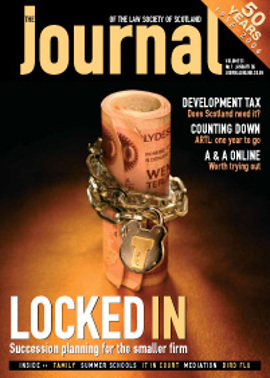A world turned upside down

“Astonished,” “gobsmacked” and “astounded” are words rarely used in the financial services industry, particularly so in relation to pension planning. However, on Tuesday 5 December I found myself using these and one or two others that are not so printable when Gordon Brown effectively closed the door to pension funds investing directly in residential property.
What is perhaps most galling is the manner in which the announcement was made. Gordon Brown stated in his pre-Budget speech that the government would move to prevent abuses of the new rules. This seemed a very innocuous statement. Indeed many commentators in the financial services industry have, myself included, penned various articles outlining the pros and cons of residential property as an investment and of course the position should any individual make personal use of the underlying asset. However, when reading the finer details of the technical note it became very clear that Chancellor Brown is using a sledgehammer to crack a very small nut.
Tearing up its own plan
It has to be remembered that the move to relax the rules to allow the investment in residential property did not originate from the financial services industry but in fact came direct from the government. Despite concerns raised throughout what has been one of the most extensive consultation exercises ever, it was confirmed in the Finance Act 2004 that these new investment rules would be introduced. The government has since had numerous opportunities to introduce other changes but failed to do so, and has left it to the last possible moment to make what must be one of the most embarrassing U-turns of recent times.
So what exactly has Gordon Brown announced? The pre-Budget report technical note (which can be found at www.hmrc.gov.uk/pbr2005/pensions-simplification.pdf) confirmed that from “A-Day” the government will remove the tax advantages for investing in residential property or certain other assets such as fine wines etc. Effectively, this change means that the purchase of a residential property will be treated as an “unauthorised member payment” and will be subject to a charge, basically recouping all the tax relief given on the monies used to buy the property.
In stark terms
What does this mean in real terms and what “charges” would apply? The member will be subject to an income tax charge of 40% on the value of the property and potentially a further 15% (unauthorised payment surcharge) if the value of the asset is more than 25% of the overall pension fund. The scheme administrator will be liable to a scheme sanction charge of 15% of the value of the property and the scheme could also risk being de-registered, which would lead to a further tax charge on the scheme administrator at the rate of 40% of the value of the scheme assets.
It doesn’t take a rocket scientist or a pension consultant to explain that, unless there are further amendments/U-turns made by the government, this certainly puts paid to holding residential property as a viable long-term investment within a SIPP.
For those potential investors who have (as the legislation permits) invested in off-plan purchases in the run-up to A-Day, the government has allowed transitional protection from the new rules. However this is on the basis that the off-plan investment does not become a residential property, i.e. the member will not face any tax charges as long as they sell their property before it becomes habitable. Easier said than done.
The last word?
The pension industry, as you can imagine, has not taken kindly to this announcement. As additional primary legislation will be required to effect these changes, the hope is that the industry can lobby to introduce a more sensible and targeted approach to the prevention of abuse rather than the sweeping all-inclusive approach so far favoured by Gordon Brown. Whether this will be achieved is debatable but I don’t think we have yet heard the end of this.
David Canning, Head of Pensions, Campbell Dallas Financial Services Ltd
t: 0141 942 6060In this issue
- Pressing ahead
- Regulation, 2006 style
- Held to ransom?
- A world turned upside down
- Quiet revolutions
- For supplement read tax
- Why mediation is a bad idea, and other myths
- Advice in a Europe of many notions
- At the touch of a button
- What sort of courts do we want? (And when?)
- KM in practice
- If the bug bites
- Refreshing risk quiz
- The partnership must go on
- First duty to the court
- A difficult birth
- Nuclear power no thanks?
- Due diligence
- Will less mean better?
- Scottish Solicitors' Discipline Tribunal
- Website reviews
- Book reviews
- Back to the future
- Users' IT requirements for ARTL






